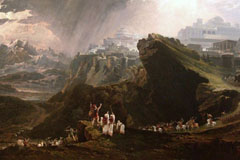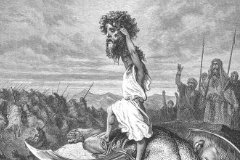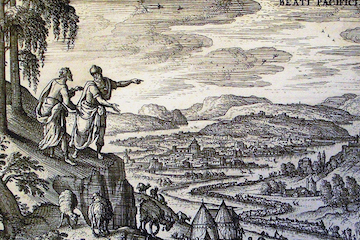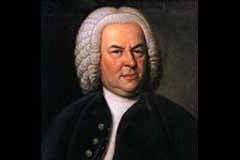林肯的蓋茨堡演辭
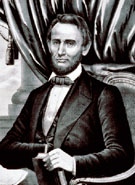
林肯
美國第十六任總統林肯,是歷來最受愛戴的人。他在蓋茨堡的演說,被認為是最佳的演說。
在美國的南北內戰中, 1863年七月的蓋茨堡戰役,是最慘烈的一役。過後,當地的一位律師David Wills提議以那戰場為國家公墓。十一月十九日,是奉獻典禮,請艾弗銳特(Edward Everett, 1794-1865)為主講人,曾任哈佛大學希臘文教授及校長,麻薩諸塞州長,國會參議員,大使,國務卿等要職,是最有名的演說家。在那天,約有一萬五千至二萬人參與典禮。艾弗銳特講完後,林肯站起來,從他帽子裏,掏出草草寫成的講稿,作短短的講話。講畢,聽眾沒有人鼓掌。第二天,艾弗銳特寫信祝賀並致敬說:“總統先生!你簡短的講話,中心表達得那麼恰切,如果我妄想自己二小時的講話,有你二分鐘所講的一半價值,就是分外之想了。”後來有人解釋為甚麼大家沒有立即反應:如果你聽了一場出色的講演,會極力鼓掌;但聽了一篇有力的講道,大家對那近於神聖啟示的氣氛,敬畏震懾,講不出話來。只是不像林肯當時所講的,世人沒有忘記他在那裏所講的話。懂得講演的人,對那短講極力的讚揚。英國牛津大學,把講辭鑄成銅牌,懸在圖書館裏。
八十有七歲之前,在這大陸上,產生了一個新國家,是我們先祖孕育於自由,奉獻於所有受造的人平等的主張。
現在,我們在進行這一場浩大的內戰,在考驗這個國家,或任何這樣孕育,這樣奉獻的國家,能否長存。我們聚集在這戰爭的偉大戰場上。我們來奉獻一部分的土地,為在此付出他們生命的人,作長眠的地方。我們這樣作,是全然應當的,合宜的。
不過,從更大的意義來說,我們不能奉獻,不能尊崇,不能聖化這土地。那些英勇的人,或生或死,在這裏搏鬥,已經聖化這土地,遠超過我們微薄的力量所能增減。世界不會注意或長久記憶,我們在這裏所說的,但永不會忘記他們在此所作的。我們生者,卻是應該在此奉獻,去繼續他們那麼高貴的進展尚待完成的工作,我們卻是要奉獻在面前偉大的未竟事功;光榮的死者,已經竭盡他們最高的忠誠,我們應該在這事業上更加忠誠。我們以高度的決心,不讓這些死者徒然而死-這個國家,在神護理之下,將有自由的新生,這民有,民治,民享的政府,永遠不會從地上滅亡。
THE GETTYSBURG ADDRESS
November 19, 1863
The battle of Gettysburg(July 1-3, 1863)is generally considered a turning point in the Civil War, although, largely as a result of Major General George G. Meade's inexcusable procrastination, Lee was not decisively defeated. Casualties were heavy, with some 7,000 killed on both sides, and almost 45,000 wounded or missing. At the dedication of the cemetery at the Gettysburg battlefield the principal oration was delivered by Edward Everett, but Lincoln's brief remarks constitute the most memorable of all American addresses.
Fourscore and seven years ago our fathers brought forth on this continent, a new nation, conceived in liberty, and dedicated to the proposition that all men are created equal.
Now we are engaged in a great civil war, testing whether that nation, or any nation so conceived and so dedicated, can long endure. We are met on a great battlefield of that war. We have come to dedicate a portion of that field, as a final resting-place for those who here gave their lives that that nation might live. It is altogether fitting and proper that we should do this.
But, in a larger sense, we cannot dedicate—we cannot consecrate—we cannot hallow—this ground. The brave men, living and dead, who struggled here, have consecrated it, far above our poor power to add or detract. The world will little note, nor long remember what we say here, but it can never forget what they did here. It is for us the living, rather, to be dedicated here to the unfinished work which they who fought here have thus far so nobly advanced. It is rather for us to be here dedicated to the great task remaining before us—that from these honored dead we take increased devotion to that cause for which they gave the last full measure of devotion—that we here highly resolve that these dead shall not have died in vain—that this nation, under God, shall have a new birth of freedom—and that government of the people, by the people, for the people, shall not perish from the earth.![]()
Abraham Lincoln, Complete Works.
ed. by John G. Nicolay & John Hay(New York, 1905), IX, pp.209-210.













